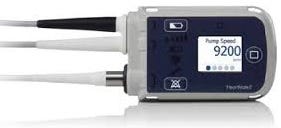Abbott Recalls Thousands of LVAD Controllers After 26 Deaths
May 24, 2017
Heart failure patients who died had tried to switch the controllers on their own, FDA says.
Nancy Crotti

Abbott has received 70 reports of incidents in which the HeartMate II's pocket system controller malfunctioned after an exchange. The company provides the backup controller to the patient in case of emergency.
Abbott is recalling nearly 29,000 HeartMate II heart failure device controllers following 26 deaths and 19 injuries among patients who tried to exchange their own controllers, according to FDA.
LVADs pump blood throughout the body when the heart is too weak to do so on its own. The pocket system controller is an external power supply that connects to the LVAD via a driveline under the skin. It can operate on batteries or when connected to a main power supply.
The HeartMate II is made by Thoratec, which St. Jude Medical acquired in 2015. Abbott acquired St. Jude in January. FDA approved HeartMate II as a bridge-to-transplant device in 2008 and a destination therapy device in 2010. The agency listed the recall as Class I, the most serious type of recall because of the potential for patient injury or death.
Abbott received 70 reports of incidents that occurred after a patient tried to exchange their own controller, company spokesman Justin Paquette told Qmed. The company provides the backup controller to the patient in case of emergency.
"The change should be done quickly and in the hospital, because it can present a significant challenge to patients that are elderly and/or untrained," the FDA statement said. "For these patients, a slow or improper driveline changeover places them at risk of serious injury or death."
Abbott began notifying customers March 29 that they should remind patients to have the pocket controller exchanged in a hospital rather than attempt the switch on their own. The alert also stressed that patients should notify their healthcare providers if an alarm appears on their controller. The recall covers 28,882 devices distributed in the United States from July 2012 to March 2017, according to FDA.
Although no devices must be returned, Abbott told providers that existing patients will receive updated device software and alarm guides for their primary and backup controllers. New patients will receive updated hardware and software, including a fully integrated controller with new alignment markings and a new driveline.
"Patients have access to controllers because that is the very part of the device they use to control their VAD and receive information about its function," Paquette said. "However during the course of VAD support, a patient's System Controller may need to be exchanged. These exchanges are best conducted by medical professionals in a controlled environment."
The controller's alarm notification system has been updated to remove noncritical advisory alerts on the patient's controller. The physician will see these alerts when the patient goes in for the next routine appointment.
"This has been classified by the FDA as a class one recall, however this is not about recalling products; rather the focus is on communication to physicians so they can ensure their patients have their controller exchange completed in a clinical setting," Paquette added. "We have also updated our software and controller alerts to help guide patients to talk to their physician when the time is approaching to have their controller exchanged."
Nancy Crotti is a contributor to Qmed.
[Image credit: FDA]
About the Author(s)
You May Also Like

.png?width=300&auto=webp&quality=80&disable=upscale)
